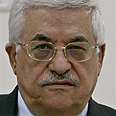
Good guys and bad guys
Gaza upheaval gives rise to simplistic view of Palestinian society
While Mahmoud Abbas was watching his followers being paraded through the streets of Gaza in their underwear with their hands above their heads, or being shot dead on live television, Prime Minister Olmert's vision suddenly cleared: Eureka! There is a partner, an able partner, a worthy partner!
Abbas, who was compelled to resign his post as prime minister of the Palestinian Authority in 2003 over Israel's unwillingness to cooperate with him on the implementation of the Road Map and who later assumed the presidency only to be met by the same cold shoulder and disregard, has suddenly become the can-do man, the go-to guy.
Yes, suddenly it's all so simple. Suddenly, it's become clear-cut. The good guys and the bad; the white hats and the black; Fatahland and Hamastan; the West Bank and the Gaza Strip.
In what is perhaps one of the most absurd PR campaigns of our time, we are being bombarded with pictures of beautiful downtown Ramallah, glibly referred to by "our correspondent in the territories" as the Palestinian Silicon Valley. The West Bank arteries that are closed to Palestinian traffic, the wall that puts miles between farmers and their fields and children and their schools, the lines at the checkpoints, the sealed shops in Hebron – these and other signs of the occupation are disappearing from our screens.
In the West Bank, we are being told, life is good and the livin' is easy. If the Gazans are being painted as Islamic fanatics, the residents of the West Bank seem to have suddenly – to paraphrase Dov Weissglas – turned into Finns. Now they can be marketed as valid negotiating partners. The Gazans are them; the West Bankers are us.
This simplistic view of the recent events in the PA is most convenient for the beleaguered Israeli prime minister. Facing what is likely to be a very long hot summer, with the final report of the Winograd Commission hanging over his head, it is no wonder that Olmert is raving about "the opportunity" to be found in this latest Palestinian catastrophe. An opportunity to be the patron. An opportunity to pull the strings. An opportunity, perhaps, to improve his ratings and save his skin.
A festering sore
As Abbas stands at what may prove to be the most critical juncture in the history of his people, struggling to find a way to defeat the forces that pose a threat to the survival of the PA while somehow preserving the unity of his fractured nation, the last thing he needs is another sloppy kiss on the cheek from Ehud Olmert. If the latest flurry of diplomatic activity ends in nothing more than a photo op and the removal of a couple of checkpoints, it could well be the kiss of death for the Palestinian Authority and its second and consequently last president.
The Palestinian people, divided into those who stayed in '48 and those who left or were driven out; divided into those in refugee camps and those outside them; divided into those under occupation and those beyond its clutches; divided into those in Areas A, B, or C, in Hebron's H1 or H2, on this side of the wall or that; this shattered nation with its "inside" and "outside" leaders has now been sliced right through the middle. Olmert may want to portray it as a clean wound, but it is jagged, bloody, and in need of urgent attention.
If isolated, Gaza will remain a festering sore that will erupt once again. Next time, it will likely spew forth al-Qaeda, and those who squeezed the life out of the democratically elected Palestinian government may yet long for its return.
It will remain to future historians to connect all the dots in this very complex picture. But we who are here today, the leaders who must make the decisions and the people who will live with their consequences, do not have the luxury of waiting generations to see how it unfolds. For us, the moment of truth has arrived.
Yes, Israel must negotiate with Abbas and must do so quickly. It should take advantage of the good offices of the Arab League to help shepherd the talks and infuse them with a regional dimension. But the talks must not be limited to the process, to confidence-building measures, to withheld taxes and interim borders. This is the time to discuss the final status: Everything on the table, until white smoke rises.
At the same time, it should be remembered that Hamas, by signing the Mecca Accord that gave birth to the short-lived Palestinian national unity government, endorsed Abbas' right to conduct such negotiations, indicating that it, too, can be a partner. Perhaps by proxy, but a partner nonetheless.
A Hamas spokesman reiterated on Friday that the movement's goal is the establishment of an independent state along the 1967 borders. This message must not fall on deaf ears. If a peace agreement is reached, it will only hold if it serves as a foundation for reuniting the Palestinian people in a national homeland that encompasses both the West Bank and the Gaza Strip. Abbas must conduct the negotiations in his capacity as the head of the PLO, the sole legitimate representative of the Palestinian people – all the Palestinian people.
Susie Becher is a member of the national executive of the Meretz-Yachad Party










